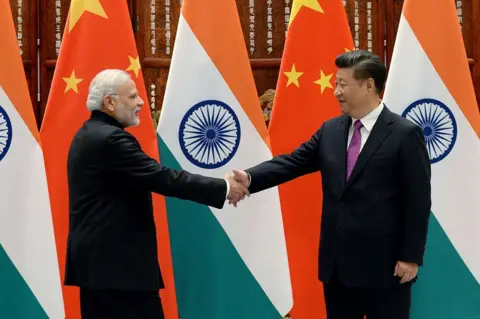The Italian luxury brand Prada has found itself at the center of a contentious debate over cultural appropriation, sparking renewed scrutiny over how foreign fashion empires interact with India's extensive artistic traditions. This scrutiny follows an incident in June, where Prada featured a shoe design shockingly similar to the Kolhapuri chappal— a time-honored handcrafted sandal from India— during its Milan runway show. The lack of acknowledgment of the Kolhapuri chappal's origins, which hail from Maharashtra, prompted significant backlash on social media and other platforms.
In light of the outrage, Prada issued a public statement recognizing the sandals' heritage, stating an intention to facilitate a "dialogue for meaningful exchange" with local Indian artisans. Recently, a Prada team met with artisans and shopkeepers in Kolhapur to gain insights into their craftsmanship. Prada characterized the discussions as "successful” and hinted at potential collaborations with these local craftsmen. This situation marks a rare acknowledgment from a high-profile brand admitting to cultural shortcomings while seeking to rectify its misstep.
Critics have long argued that leading global brands frequently draw inspiration from South Asian cultures without paying homage or credit to their origins. High-profile cases, including accusations against Reformation and H&M, highlight a troubling pattern where cultural elements are repurposed without due respect. A recent critique aimed at Dior’s Paris collection reveals mounting frustration, as designers overlook the significance of traditional techniques like mukaish work from India in their international showcases.
Not all experts are unsympathetic to luxury brands' causes, pointing out that such cultural inspirations can amplify local aesthetics on the global stage. However, industry insiders emphasize the importance of cultural sensitivity, urging brands to understand the nuances and historical contexts of the cultures they borrow from. Shefalee Vasudev, a notable Delhi fashion writer, advocates for accountability in design practice, insisting that acknowledging heritage is a fundamental responsibility.
The luxury market in India, potentially projected to reach a valuation of $14 billion by 2032, reveals a bustling opportunity for global brands. Still, some industry veterans argue that many luxury companies refuse to see India as a significant consumer market filled with lasting potential. Arvind Singhal, chairman of Technopak, observes that while there is some interest from the affluent elite, overall brand recognition among average Indians remains limited.
Fashion designer Anand Bhushan expresses concerns that foreign brands mistakenly view India purely as a production hub while neglecting its potential as a vibrant market filled with discerning consumers. He insists that misinterpretation of cultural symbols must not overshadow the authenticity of India's rich design narrative.
The recent backlash against Prada is not limited to that singular brand; it's a reflection of widespread frustrations building over the years. From Karl Lagerfeld’s controversial Métiers d'Art collection to more recent instances of cultural oversights, the fashion industry continues to grapple with the complexities of appropriation.
While some believe swift changes must occur within the luxury sector, others warn that genuine respect for India’s heritage and craftsmanship can only flourish with reciprocal appreciation from Indian consumers. Those advocating for local artisans urge societal support to safeguard traditional crafts and techniques from external exploitation.
The challenge lies not only within multinationals addressing their lack of cultural awareness but also within India promoting and uplifting its own heritage. With decades of experience, artisans labor tirelessly to create unique pieces, often without recognition or fair remuneration. Laila Tyabji, chairperson of Dastkar, emphasizes that a profound shift in values—recognizing and valuing handcrafted traditions—could inhibit future cultural appropriation by pushing for a more equitable understanding and collaboration between the global fashion arena and India’s vibrant heritage.






















